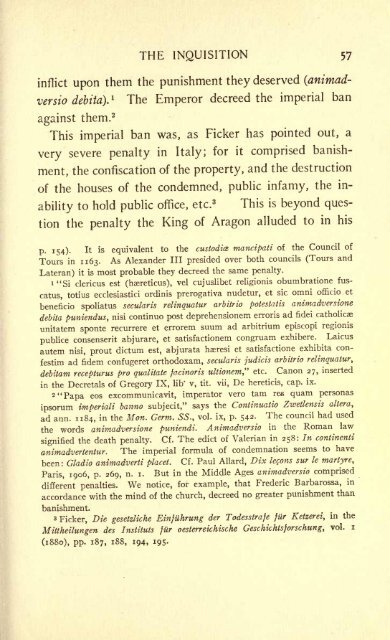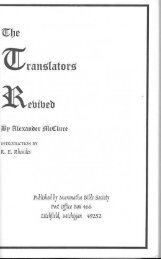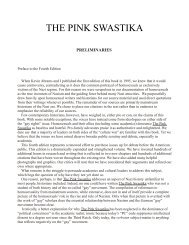Untitled - Shattering Denial
Untitled - Shattering Denial
Untitled - Shattering Denial
Create successful ePaper yourself
Turn your PDF publications into a flip-book with our unique Google optimized e-Paper software.
THE INQUISITION 57<br />
inflict upon them the punishment they deserved (animadversio<br />
debita). l The Emperor decreed the imperial ban<br />
them. 2<br />
against<br />
This imperial ban was, as Picker has pointed out, a<br />
very severe penalty in Italy; for it comprised banish<br />
ment, the confiscation of the property, and the destruction<br />
of the houses of the condemned, public infamy,<br />
the in<br />
ability to hold public office, etc. 3 This is beyond ques<br />
tion the penalty the King of Aragon<br />
alluded to in his<br />
p. 154). It is equivalent to the custodies mancipati of the Council of<br />
Tours in 1163. As Alexander III presided over both councils (Tours and<br />
Lateran) it is most probable they decreed the same penalty.<br />
i"Si clericus est (hsereticus), vel cujuslibet religionis obumbratione fuscatus,<br />
totius ecclesiastic! ordinis prerogativa nudetur, et sic omni officio et<br />
beneficio spoliatus secularis relinquatur arbitrio potestatis animadversions<br />
debita puniendus, nisi continue post deprehensionem erroris ad fidei catholicae<br />
unitatem sponte recurrere et errorem suum ad arbitrium episcopi regionis<br />
publice consenserit abjurare, et satisfactionem congruam exhibere. Laicus<br />
autem nisi, prout dictum est, abjurata haeresi et satisfactione exhibita confestim<br />
ad fidem confugeret orthodoxam, secularis judicis arbitrio relinquatur,<br />
debitam ultionem" etc. Canon<br />
recepturus pro qualitate facinoris 27, inserted<br />
in the Decretals of Gregory IX, lib v, tit. vii, De hereticis, cap. ix.<br />
2 "Papa eos excommunicavit, imperator vero tarn res quam personas<br />
ipsorum imperiali banno subjecit," says the Continuatio Zwetlensis altera,<br />
ad ann. 1184, in the Man. Germ. SS., vol. ix, p. 542. The council had used<br />
the words animadversione puniendi. Animad-versio in the Roman law<br />
signified the death penalty. Cf. The edict of Valerian in 258: In continent<br />
animadvertentur. The imperial formula of condemnation seems to have<br />
been: Gladio animadverti placet. Cf. Paul Allard, Dix lemons sur le martyre,<br />
Paris, 1906, p. 269, n. i. But in the Middle Ages animadversio comprised<br />
different penalties. We notice, for example, that Frederic Barbarossa, in<br />
accordance with the mind of the church, decreed no greater punishment than<br />
banishment.<br />
sFicker, Die gesetzliche Einfuhrung der Todesstrafe fur Ketzerei, in the<br />
Mittheilungen des Instituts }ur<br />
(1880), pp. 187, 188, 194, 195-<br />
oesterreichische Geschichtsjorschung, vol. i









